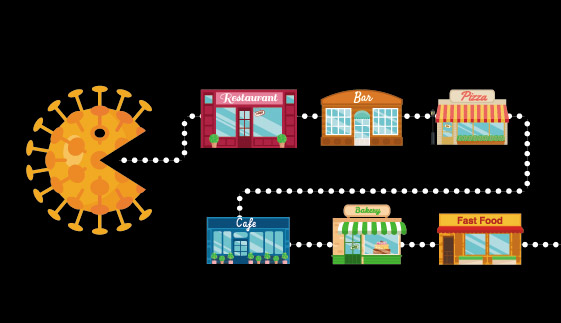
Illustration by Maria Ratinova
As President Donald Trump sent us into the weekend under national emergency due to the spread of coronavirus, some Sacramento restaurants and breweries continued to host live music and even baby showers.
But by Sunday afternoon, Gov. Gavin Newsom directed all bars, nightclubs, wineries and breweries to close voluntarily. And on Monday night, he told restaurants to close their doors for dine-in customers and operate only take-out. Mayor Darrell Steinberg urged restaurants to move entirely to curbside pickup.
What followed was a series of Sacramento restaurants closing to the public, including Jim’s Good Food, which started an employee relief fund through GoFundMe. Randall Selland, executive chef and owner of Selland’s Family Restaurants, announced on Twitter that his family was devastated that they had to lay off two-thirds of its staff. He said that Obo and Selland’s restaurants will continue to offer walk-in and curbside pickups.
Before Newsom’s directive, popular Sacramento spots such as Allora, Woodlake Tavern and Hook & Ladder Manufacturing Co. served customers at half capacity per Newsom’s guidelines. Restaurants are adapting in these uncertain times, with that reality changing day by day.
“We’re playing this minute by minute because things are changing,” said Deneb Williams, CEO and chef at WM Restaurants, which owns Woodlake Tavern, a gastropub that sells comfort food, and Allora, a fine-dining restaurant.
Williams told SN&R that he and staff removed half of the tables from both restaurants on Sunday. As for the overall vibe with customers last weekend, he said staff and guests were upbeat. But the impact this virus will have on the industry here and nationwide is undeniable.
Danny Meyer, one of the country’s most successful and famous restaurateurs, closed all 19 of his restaurants, including Blue Smoke and Gramercy Tavern in New York City. In Seattle, James Beard award-winning chef Tom Douglas closed 12 of 13 of his establishments and let go 800 employees.
“I don’t know what is going to happen. I know that my company is prepared. We’re in a pretty good spot even if we had to close down for two months, we can do that. And we would reopen,” Williams said. “If you want all of these restaurants to be here when it’s over—support them. I fear the tip of the iceberg. I think the next couple of weeks are going to be even harder and we just all have to prepare for that.”
Last Friday in Midtown, longtime music venue Harlow’s Restaurant & Nightclub hosted British R&B group Loose Ends. Harlow’s, which has 55 employees, has since turned off the stage lights and closed its kitchen. Its entire entertainment calendar is canceled for the rest of March.
“One of our biggest concerns is our staff, our workforce, but it goes further than that,” said owner Rod Elliot. “Every business relies on parts of the web of the social and service industry to operate. For example, we’re not going to be ordering spirits, we’re not going to be ordering food, we’re not going to be ordering linen. This has the potential to affect a lot of people in a very short period of time.”
With its front door propped open, Hook & Ladder executive chef Anthony Scuderi said it’s one less door handle for customers to worry about. Besides that small consideration, the restaurant also removed half of its dining room tables and continues to use delivery services such as DoorDash, and offers phone orders with curbside pickup.
“You’ll be able to call us, we’ll place your order and we’ll take your credit card over the phone. That way once you get there, all we have to do is meet you outside, give you your credit card slip that you will sign and you don’t have to worry about coming into the restaurant at all,” Scuderi said.
Scuderi added that Hook & Ladder’s building owner reached out to the restaurant and offered to defer April’s rent and plans to work with them through May and June.
“The restaurant pays its rent on the customers that come in here, and when we’re dealing with a crisis like this it’s a little bit out of our hands,” Scuderi said. “[Our building owner]’s going to give us a lot of leeway and make it possible for the restaurant to still be around.”
The Sacramento City Council has approved $1 million in city aid to help retail businesses and restaurants. It may also offer zero-interest loans of as much as $25,000 to businesses suffering financial loss due to the coronavirus.
Elliott is hoping the government will extend more assistance to mom-and-pop establishments that create the unique cultures not just in Sacramento but also throughout the country.
“All small business—not just the hospitality industry—all small businesses are essentially a backbone component of economy,” he said. “At this time, it’s a little frightening, but we also have high hopes that we’ll get through this. Our downtown, Midtown and surrounding areas are going to bounce back and be as strong as ever when this blows through and everybody gets healthy and everything gets right again.”
